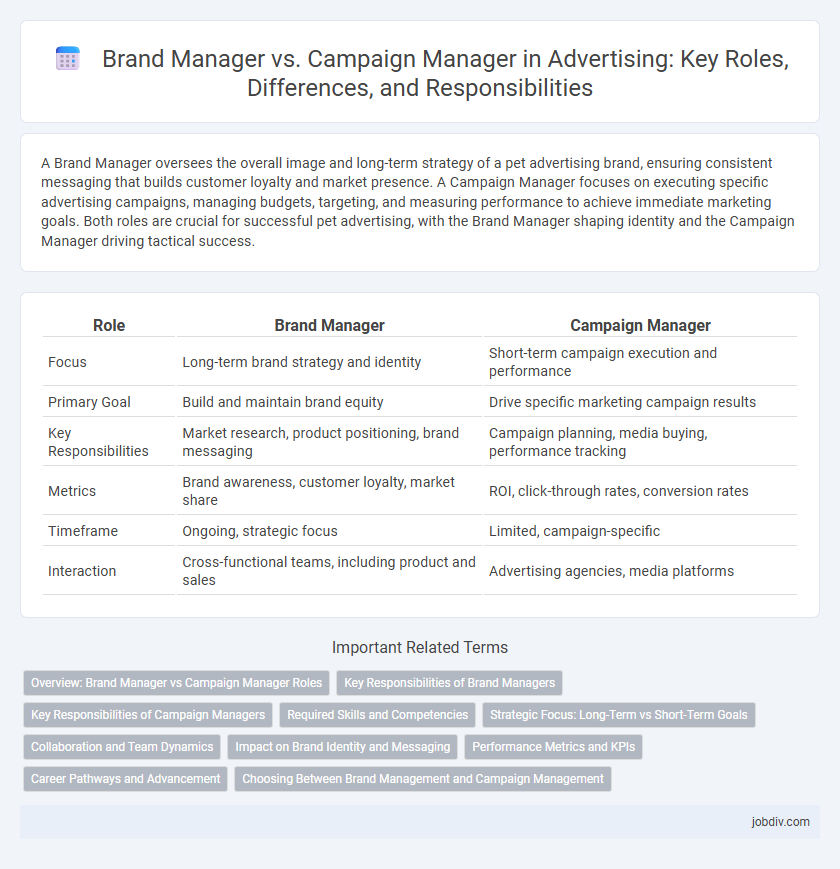A Brand Manager oversees the overall image and long-term strategy of a pet advertising brand, ensuring consistent messaging that builds customer loyalty and market presence. A Campaign Manager focuses on executing specific advertising campaigns, managing budgets, targeting, and measuring performance to achieve immediate marketing goals. Both roles are crucial for successful pet advertising, with the Brand Manager shaping identity and the Campaign Manager driving tactical success.
Table of Comparison
| Role | Brand Manager | Campaign Manager |
|---|---|---|
| Focus | Long-term brand strategy and identity | Short-term campaign execution and performance |
| Primary Goal | Build and maintain brand equity | Drive specific marketing campaign results |
| Key Responsibilities | Market research, product positioning, brand messaging | Campaign planning, media buying, performance tracking |
| Metrics | Brand awareness, customer loyalty, market share | ROI, click-through rates, conversion rates |
| Timeframe | Ongoing, strategic focus | Limited, campaign-specific |
| Interaction | Cross-functional teams, including product and sales | Advertising agencies, media platforms |
Overview: Brand Manager vs Campaign Manager Roles
Brand Managers oversee the overall brand strategy, ensuring consistent messaging, brand positioning, and long-term equity across all marketing channels. Campaign Managers focus on executing specific marketing campaigns, managing timelines, budgets, and performance metrics to optimize campaign effectiveness. Both roles collaborate closely, but Brand Managers drive broad brand vision while Campaign Managers handle tactical campaign delivery.
Key Responsibilities of Brand Managers
Brand Managers oversee the development and execution of brand strategies to enhance market position and consumer perception. They conduct market research, analyze consumer insights, and coordinate cross-functional teams to ensure consistent brand messaging across all channels. Their key responsibilities include managing brand equity, planning long-term branding initiatives, and monitoring competitor activities to maintain a competitive advantage.
Key Responsibilities of Campaign Managers
Campaign Managers oversee the planning, execution, and optimization of marketing campaigns, ensuring alignment with target audience goals and budget constraints. They analyze campaign performance using tools like Google Analytics and Facebook Ads Manager to adjust strategies in real-time for maximum ROI. Collaboration with creative teams and media buyers is essential to coordinate messaging, timing, and channel placement effectively.
Required Skills and Competencies
Brand Managers must possess strategic thinking, market analysis expertise, and strong leadership skills to develop and maintain a brand's identity across multiple channels. Campaign Managers require proficiency in project management, data-driven decision making, and digital marketing tools to execute and optimize specific marketing campaigns effectively. Both roles demand excellent communication abilities and adaptability to rapidly changing market conditions.
Strategic Focus: Long-Term vs Short-Term Goals
Brand Managers concentrate on long-term strategic goals by building brand equity, maintaining consistent brand messaging, and fostering customer loyalty over time. Campaign Managers prioritize short-term objectives, driving immediate results through targeted marketing efforts and specific promotional campaigns. Both roles collaborate to ensure overall marketing success, balancing enduring brand value with timely campaign performance.
Collaboration and Team Dynamics
Brand Managers oversee overall brand strategy, ensuring consistent messaging and long-term vision, while Campaign Managers execute targeted marketing initiatives focusing on short-term goals and deliverables. Effective collaboration between these roles enhances team dynamics by blending strategic brand alignment with tactical campaign execution, resulting in cohesive and impactful advertising efforts. Their partnership fosters transparent communication, agile adjustments, and synchronized workflows, driving optimized campaign performance and brand growth.
Impact on Brand Identity and Messaging
Brand Managers shape long-term brand identity by overseeing consistent messaging, visual style, and values across all marketing channels, ensuring a cohesive brand experience that resonates with target audiences. Campaign Managers focus on executing specific promotional initiatives, optimizing messaging and creative elements to maximize engagement and response within a defined timeframe. The synergy between Brand and Campaign Managers is critical to maintaining brand integrity while driving effective, targeted advertising campaigns.
Performance Metrics and KPIs
Brand Managers prioritize long-term performance metrics such as brand equity, market share, and customer lifetime value to ensure sustained growth and brand loyalty. Campaign Managers focus on short-term KPIs including click-through rates (CTR), conversion rates, cost per acquisition (CPA), and return on ad spend (ROAS) to optimize individual campaign effectiveness. Both roles rely on data analytics, but their key performance indicators reflect different goals within the advertising lifecycle.
Career Pathways and Advancement
Brand Managers typically oversee overall brand strategy, developing long-term positioning and market growth plans, while Campaign Managers focus on executing specific marketing campaigns targeting short-term goals. Career advancement for Brand Managers often leads to roles such as Marketing Director or Chief Marketing Officer (CMO), emphasizing strategic leadership and brand equity management. Campaign Managers usually progress to Senior Campaign Manager or Media Director roles, specializing in tactical execution and performance optimization within advertising teams.
Choosing Between Brand Management and Campaign Management
Choosing between brand management and campaign management depends on strategic goals and skill sets; brand managers focus on long-term brand equity, market positioning, and consistent messaging, while campaign managers drive short-term marketing initiatives, performance metrics, and targeted audience engagement. Brand management requires expertise in consumer insights, brand architecture, and cross-channel branding, whereas campaign management demands proficiency in project execution, data analysis, and media planning. Effective decision-making between roles hinges on aligning organizational priorities with specialized competencies to maximize advertising impact.
Brand Manager vs Campaign Manager Infographic

 jobdiv.com
jobdiv.com